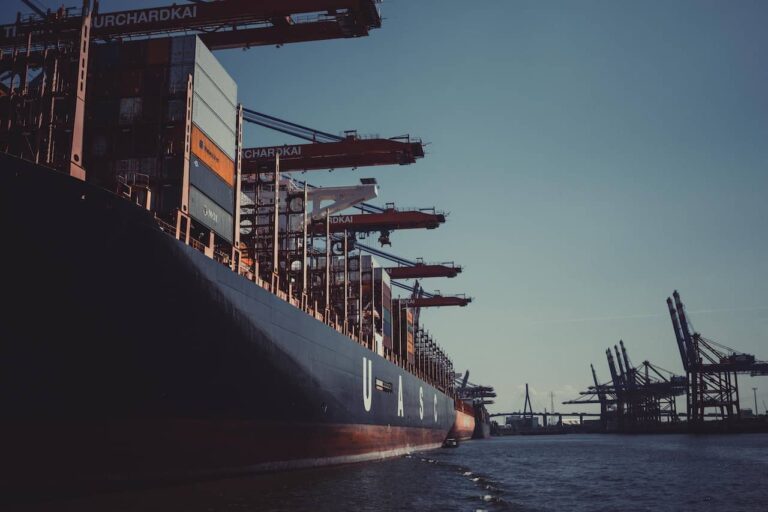Shipping hubs are vital components of the global economy as they serve as the primary gateways for international trade. These hubs are major centers of transportation and logistics, where goods are consolidated, processed, and shipped to various destinations around the world.
In recent years, container ships have carried an increasing amount of cargo throughout the world. Let’s take a look at some major shipping hubs across the globe.
Table of Contents
The 7 major shipping hubs worldwide
The following are the seven major shipping hubs worldwide:
Shanghai port
Shanghai is China’s largest and busiest port and the third busiest in the world. Thus handling more than 43 million TEUs of cargo each year. The port is strategically located at the mouth of the Yangtze River. It serves as a gateway to China’s vast manufacturing sector, connecting the country to global markets. Shanghai’s port is equipped with modern technology and has a massive capacity for container handling.
The Shanghai Yangshan Deep-Sea Port, the biggest freight terminal in the world with a computerized shipping load/unload system, moved into the Port of Shanghai in the latter part of 2017.
A cruise ship terminal is also there, and about 1 million cruise passengers come to Shanghai each year.
The port handles a diverse range of cargo, including containerized goods, bulk cargo, and vehicles.
Singapore port
The Port of Singapore is regarded as one of the top shipping hubs in the world. This is because it uses innovative technology to increase operational effectiveness. A maritime sense-making system and remote control vessel pilotage are additional advancements that aim to enhance transportation systems by preventing unlawful bunkering and maximizing anchorage use.
The port handles more than 36 million twenty-foot equivalent units (TEUs) of cargo each year. Making it the busiest port in Southeast Asia. The port is equipped with state-of-the-art technology and infrastructure, making it one of the most efficient and reliable ports in the world.
Port of Ningbo-Zhoushan
Ningbo-Zhoushan is the second-largest port in China, with a cargo throughput of over 1 billion tons in 2020. Located on the coast of Zhejiang province.
The volume of goods moving through Ningbo Zhoushan Port has significantly increased since 2005. The Ningbo Zhoushan Port securely held third place in the world with a container throughput of 27.535 million TEUs in 2019 (and 31.1 million TEUs in 2021). The total shipment volume was 1.12 billion tons, placing it first globally for 11 years.
Busan port
Busan is South Korea’s largest port, with a cargo throughput of over 21 million TEUs (twenty-foot equivalent units) in 2020.
The port is sixth in the world for container throughput. The Busan Port Authority, a 2004 public business created, is in charge of running the port. At ten container terminals in Busan, 22.7 million TEUs were handled in 2019.
Despite being fourth on our list, this port ranks third globally in terms of transshipment traffic. The Port of Busan is moved to second place in the shipping industry. This is because of significant investments made by the South Korean government to boost these operations.
Hong Kong port
Hong Kong is a major transshipment hub in East Asia.
This deepwater port in the South China Sea is primarily used for the transshipment of people, raw materials, and manufactured goods in containers.
The Port of Hong Kong, which has one of the smallest processing and storage areas for shipments (2.790 square kilometers). Nonetheless, it is still more than capable of meeting the needs of the entire managerial region of Hong Kong and linking its harbor with more than 470 different ports worldwide.
Rotterdam port
Located in and around the city of Rotterdam, in the Dutch province of South Holland, the Port of Rotterdam is a major port in Europe. And, the largest seaport apart from East Asia. According to the annual tonnage of goods, it was the busiest port in the world from 1962 to 2004. Singapore’s port was the first to surpass it in 2004. And since then Shanghai and other sizable Chinese seaports have surpassed it. By handling twenty-foot equivalent units (TEU), Rotterdam ranked as the tenth-largest container port in the world in 2020.
Rotterdam’s port is equipped with advanced technology and is known for its excellent infrastructure and efficient logistics.
Qingdao port
Operations at the seaport of Qingdao began in 1892. The Port of Qingdao is one of the largest ports in the world. And, a crucial hub for international trade and transportation in the West Pacific. It is situated between the Bohai Rim port region and the Yangtze River Delta port region in the PRC. It occupies a central position among ports in Northeast Asia.
Its four main terminals are located in the port regions of Dagang, Qianwan, Dongjiakou, and Huangdao. They can manage over 500 billion tons when used collectively.
Read also: Which countries export the most? The ranking and the turnovers
Shipping hubs’ significance cannot be overstated
Shipping hubs play a vital role in global trade, and their significance cannot be overstated. These ports are the gateways for the movement of goods between different regions and countries. And they are equipped with modern technology and infrastructure that ensure the efficient and timely processing of cargo.
The ports mentioned above are just a few of the many major shipping hubs worldwide that contribute to the global economy’s growth and development.












